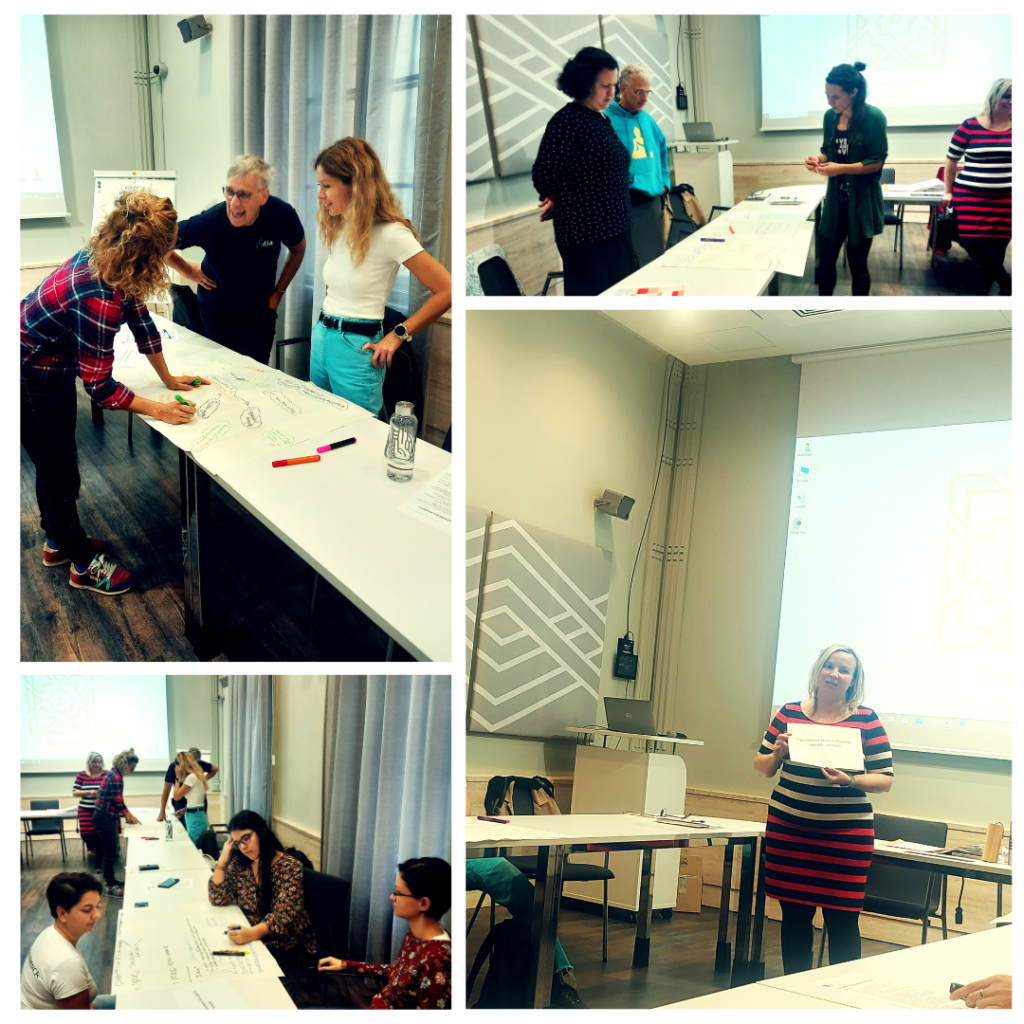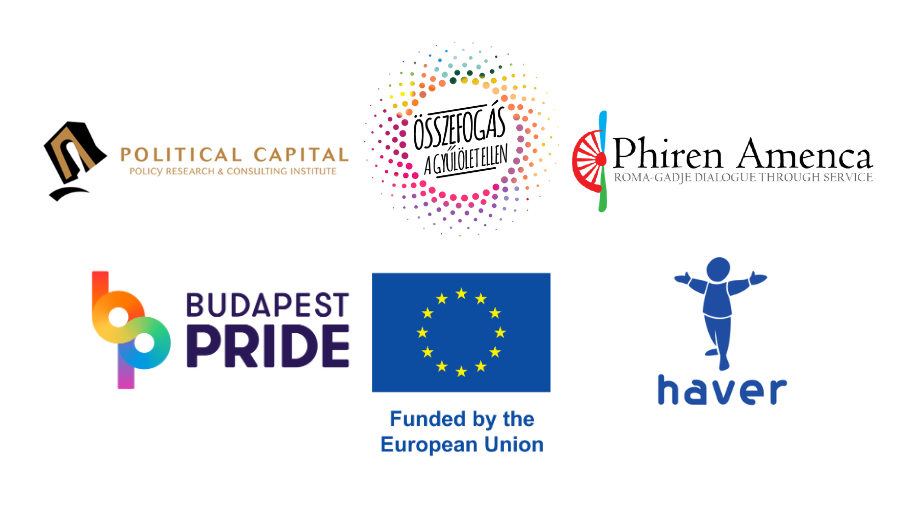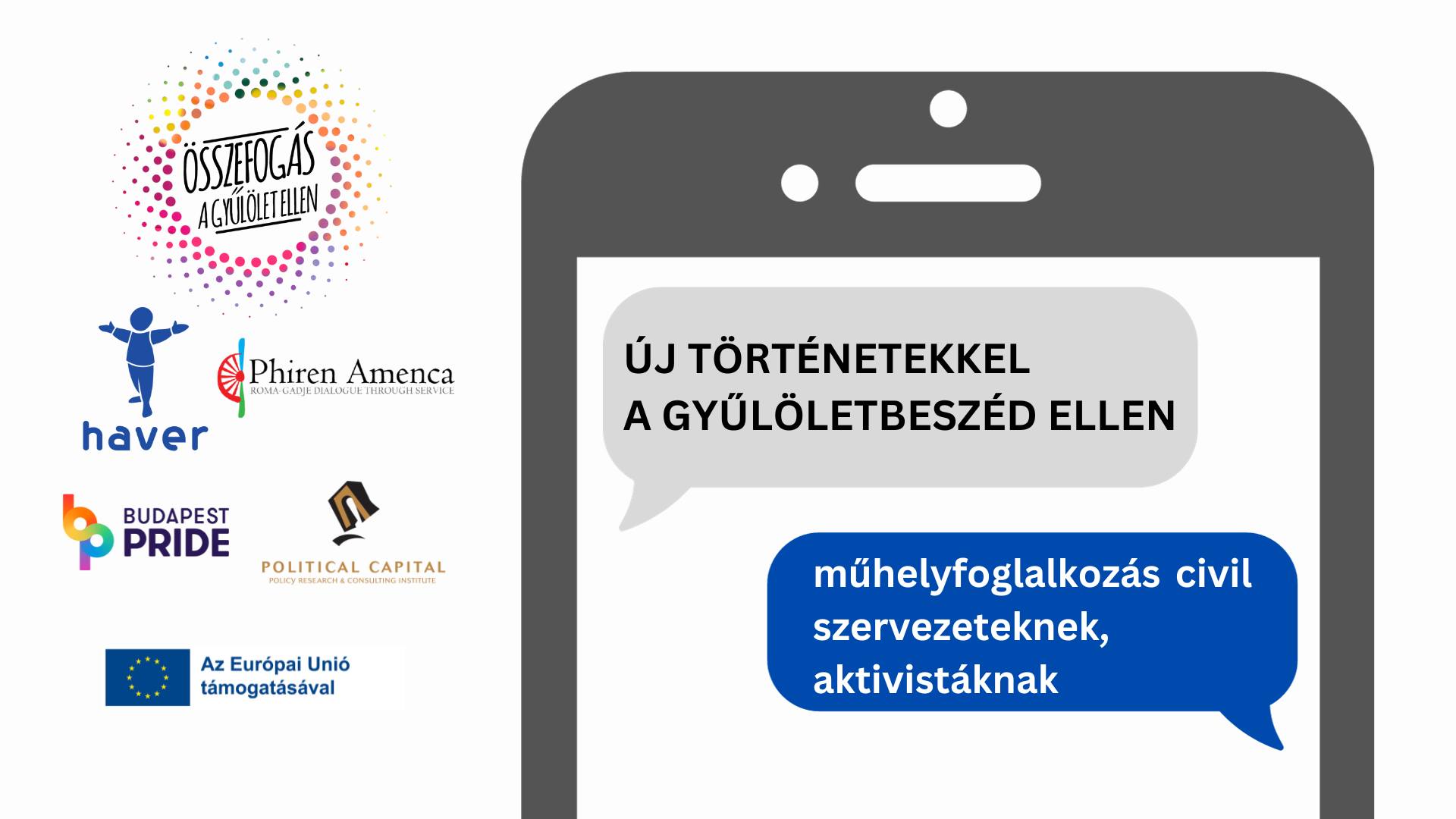Training for civil society representatives
(Görgess le a magyar szöveghez)
The “New Narratives Against Hate Speech” training, held on October 13, 2023, at the Rumbach Street Synagogue, provided a platform for civil organizations and activists to address the pressing issue of hate speech and explore strategies for combatting it through counter- and alternative narratives. Facilitated by Dr. Katalin Baracsi, the workshop aimed to empower participants with new skills and techniques to tackle hate speech more appropriately.
The day began with an interactive opening session, setting the stage for discussions on human rights, freedom of expression, and the legal background and consequences of hate speech. After the definitions and basic dilemmas presented by the facilitator, small groups had been created in which participants had the chance to discuss these aspects in detail and share their own experiences related to the topics. At the end of the session the groups presented the main points of the discussions.
After a brief break, the workshop delved into the issue of hate speech, with sessions focused on defining hate speech, understanding the legal frameworks surrounding it, and addressing the challenges of online hate speech.
A sandwich lunch provided a space for informal discussions and networking, enhancing collaboration among participants. The afternoon session centered on the presentation of counter- and alternative narratives, highlighting the process of creating such narratives and sharing best practices from diverse contexts. Some examples of best practices were also shown to inspire the participants to create their own narratives.
Following another break, participants engaged in designing their own counter or alternative narratives, applying the knowledge and insights gained throughout the workshop. Here the participants had been divided into small groups based on the focus of their activity. As a first step the group had to define the narrative they wanted to tackle with a counter or alternative narrative. Afterwards they had to go through those steps that are crucial to build up such a narrative, the means and partners they need to have in order to implement them successfully and also had to write down the steps how they imagined to realize this plan. The day concluded with presentations and evaluations of the planned narratives, emphasizing the importance of storytelling in combating hate speech, and closing remarks.
After the training, Anikó Félix (Haver) and Anna Daróczi (RGDTS) and one of the participants were invited to give an interview about the event in one of the Hungarian online radio stations.

Új történetekkel a gyűlöletbeszéd ellen
Képzés civil szervezeteknek és aktivistáknak
Az “Új történetekkel a gyűlöletbeszéd ellen” című képzés, amelyet 2023. október 13-án tartottunk a Rumbach utcai zsinagógában, platformot biztosított a civil szervezetek és aktivisták számára, hogy a gyűlöletbeszéd égető problémájával foglalkozzanak, és feltárják a gyűlöletbeszéd elleni küzdelem stratégiáit ellen- és alternatív narratívák segítségével. A Dr. Baracsi Katalin által moderált workshop célja az volt, hogy a résztvevőket új készségekkel és technikákkal vértezze fel a gyűlöletbeszéd megfelelőbb kezelése érdekében.
A nap egy interaktív nyitóüléssel kezdődött, amely megalapozta az emberi jogokról, a véleménynyilvánítás szabadságáról, valamint a gyűlöletbeszéd jogi hátteréről és következményeiről szóló beszélgetéseket. A facilitátor által ismertetett definíciók és alapvető dilemmák után kiscsoportokat alakítottunk ki, amelyekben a résztvevőknek lehetőségük nyílt arra, hogy részletesen megvitassák ezeket a szempontokat, és megosszák a témákkal kapcsolatos saját tapasztalataikat. A foglalkozás végén a csoportok bemutatták a megbeszélések főbb pontjait.
Rövid szünet után a műhely a gyűlöletbeszéd kérdésében mélyült el, a gyűlöletbeszéd meghatározására, az azt övező jogi keretek megértésére és az online gyűlöletbeszéd kihívásainak kezelésére összpontosító feladatokkal.
A szendvicsebéd teret adott az informális ismerkedésnek és a kapcsolatépítésnek, ami elősegítette a résztvevők közötti együttműködést. A délutáni ülés középpontjában az ellen- és alternatív narratívák bemutatása állt, kiemelve az ilyen narratívák létrehozásának folyamatát és a különböző kontextusokból származó jógyakorlatok megosztását. A jógyakorlatokra példákat is bemutatottunk, hogy a résztvevőket saját narratívák létrehozására ösztönözzék.
Egy újabb szünetet követően a résztvevők saját ellen- vagy alternatív narratíváik megtervezésében vettek részt, alkalmazva a műhely során szerzett ismereteket és meglátásokat. Itt a résztvevőket a tevékenységeik fókusza alapján kiscsoportokra osztottuk. Első lépésként a csoportnak meg kellett határoznia azt a narratívát, amelyet ellen- vagy alternatív narratívával kívántak kezelni. Ezt követően végig kellett menniük azokon a lépéseken, amelyek elengedhetetlenek egy ilyen narratíva felépítéséhez, valamint fel kellett sorolniuk azokat az eszközöket és partnereket, amelyekre szükségük van a sikeres megvalósításhoz, és le kellett írniuk azokat a lépéseket is, amelyekkel elképzeléseik szerint ezt a tervet meg lehet valósítani. A nap a tervezett narratívák bemutatásával és értékelésével zárult, hangsúlyozva a történetmesélés fontosságát a gyűlöletbeszéd elleni küzdelemben.
A tréninget követően Félix Anikó (Haver) és Daróczi Anna (RGDTS), valamint az egyik résztvevő interjút adott az eseményről az egyik magyar online rádióban:

The „CHAD – Countering Hate Speech and Hurtful Speech against Diversity: Roma, LGBTIQ, Jewish and Migrant Communities” project (project nr. 101049309) is funded by the Citizens, Equality, Rights and Values Programme (CERV) of the DG Justice, European Commission and coordinated by RGDTS Nonprofit Llc. in partnership with Haver Informal Educational Foundation, Rainbow Mission Foundation and Political Capital. Views and opinions expressed are however those of the author(s) only and do not necessarily reflect those of the European Union or the Citizens, Equality, Rights and Values Programme. Neither the European Union nor the granting authority can be held responsible for them.


